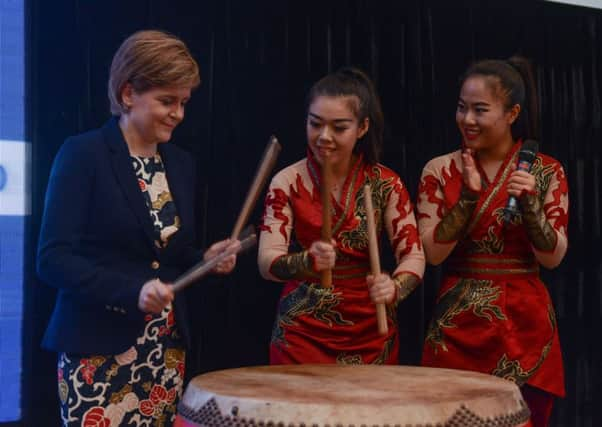Questions over China deal remain


Whether Keith Brown is familiar with JFK’s oft-repeated trope is not clear, but it seems especially prescient in light of the Scottish Government’s efforts to dig itself further into a hole over the breakdown of the potential £10 billion investment by two state-backed Chinese firms.
It is a deal that appears to have unravelled in calamitous fashion following reports that the companies cancelled a Memorandum of Understanding (MoU) struck with First Minister Nicola Sturgeon. The agreement with representatives from SinoFortune and China Railway No 3 Engineering Group (CR3) was made in March, but only came to light the following month after details in the Chinese press were picked up here.
Advertisement
Hide AdAdvertisement
Hide AdSoon afterwards, the questionable track record of the latter firm was highlighted. Two years previously, the Norwegian pension fund’s ethics council warned of an “unacceptable risk” that CR3’s owners, China Railway Group, was involved in “gross corruption”. The investment fund pulled its £26m stake, stating that there was a high likelihood the firm had paid bribes to government officials for construction contracts.
A year before that, Amnesty International published a 41-page report implicating China Railway Group in a litany of human rights violations in the Democratic Republic of Congo, where entire communities have been forcibly evicted from mining sites and child labour used for heavy industrial work.
These are hardly niggling flaws. Unsurprisingly, it was not long before a chorus of criticism was levelled at the Scottish Government from opposition parties, human rights groups, and anti-corruption bodies for even contemplating getting into bed with such an organisation.
By the fevered standards of Scottish political discourse, the reaction was proportionate and indeed, focused. Willie Rennie in particular lodged a series of probing questions seeking further details concerning the MoU, a not unreasonable course of action given the government’s reluctance to disclose it voluntarily.
According to Mr Brown, however, this outcry is responsible for the prospective deal’s demise. Following the latest reports at the weekend, his office went on the offensive, blaming a “climate of hostility” stirred up by other parties. His spokesman added: “The opposition should be ashamed of themselves if their actions, in search of cheap headlines, have put up to £10bn of investment at risk. The Scottish Government will do everything we can to make sure that Scotland is open for business. It would be helpful if opposition parties joined us in making the case for Scotland, rather than doing Scotland down.”
Whichever way you cut it, this statement is an extraordinary act of deflection. Eight months after the MoU was signed, it does not confirm its status, arrogantly dismisses the concerns of Amnesty International, and places undue emphasis on Holyrood’s global reach; President Xi Jinping may have embarked on an unprecedented anti-corruption drive, but the fervour of his mission is unlikely to extend to checking Jackie Baillie’s Twitter feed for angry emojis.
What is most damning, however, is Mr Brown’s decision to ignore the valid questions that have been raised about CR3 and its problematic corporate track record. The Scottish Government has said that as only a MoU was agreed, full due diligence had yet to take place. Given the concerns expressed from Norway and Amnesty International were only a quick Google search away, this argument is wafer-thin.
The documents that have been released into the public domain so far show that, as far back as last year, officials from Scottish Development International had spent several months engaging with the Chinese firms’ representatives. Quite how they were unable to ask the most rudimentary of questions about corruption allegations is unclear.
Advertisement
Hide AdAdvertisement
Hide AdGiven the scale of the companies involved, the issues should have been picked up on SDI’s radar. With offices in Beijing, Shanghai, Shenzhen, Hong Kong and Taipei, the agency responsible for promoting investment deals and exports overseas has a sizeable presence in the region. It would be hoped that it has its ear to the ground when it comes to potential investors in Scotland.
There must be greater transparency surrounding the genesis of the £10bn China deal and its collapse, but the Scottish Government will also have to carefully consider the wider repercussions.
If SDI failed to flag up he problems with CR3, it hardly bodes well for Scotland’s international trade relationship at a time when the UK government continues to lurch from one crisis to the next over its post-Brexit plan.
Last month, Ms Sturgeon launched a pre-emptive strike against this bungling by announcing stronger Scottish trade links with the European Union, a stance that would see a doubling in the staff numbers at SDI. The veil of secrecy in China may pose its own unique challenges, but the farce over the MoU hardly shows SDI in a favourable light.
Scotland needs inward investment and if it can attract some of estimated £100bn China intends to funnel into UK infrastrucure projects by 2025, all the better. The recklessness of this recent venture, however, suggests that will be an uphill battle.